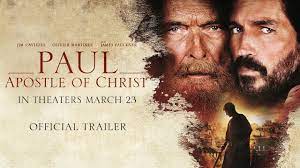PAUL, APOSTLE OF CHRIST: the movie

Netflix has incorporated into its collection this film about Saint Paul, who approaches the apostle's last days in the Mamertine prison in Rome, in the year 67, in the spirit of the second letter to Timothy, 4, 6-8: “I I am about to offer my life, and the moment of my departure is imminent. I have fought the good fight, I have finished my career, I have kept the faith. It only remains for me to receive the crown of salvation that the Lord will give me ”. It is shocking to see the huge evangelizer now old, weak, tortured in his body but also in his soul, remembering his young years as a persecutor of Christians. Weak but not defeated, but firm in faith: “I know in whom I have put my trust” (2 Tim 1, 12); and totally convinced that the greatest thing is love.
The young Catholic director and screenwriter Andrew Hyatt (1982, Colorado) imagines the last days of Saint Paul, a prisoner in Rome, and makes him coincide with Lucas, with Aquila and Priscilla, and with Mauritius, the prefect of the prison, and weaves a history between them. Neither of these encounters is probable, nor something historical; It is only a cinematographic fiction, but one that enhances the figure and message of Saint Paul, so deeply true.
The cinematographic resource is to make two great Christians and apostles meet in Rome so that Luke writes the testimony of life that Paul tells him, as it will appear in the book of Acts of the Apostles, even knowing that this writing ends in the first arrival of Pablo to Rome and not in the last one, which the film narrates. Even so, we can imagine the encounters full of affection and devotion that both would have had in various moments of mission.
An important place in the film is the life of Christians in Rome, especially under the violent and bloody persecution of Nero. The witness of the martyrs is something true and very valuable, which reaches us as a stimulus for our life of faith. In fact the film is dedicated, in a final message, to all Christians persecuted for their faith. We cannot stop thinking of countries like Somalia, Pakistan, Afghanistan, Syria, where thousands are now being persecuted and killed.
Another aspect to highlight in the film is the question that is presented to the first Christians living in Rome whether to stay in the city or not, aware of the persecution. There is a plausible division of opinion; Pablo and Aquila invite personal and common discernment to make their decision before the Lord. In the film, some of the young Christians decide to take up arms and rebel against Nero, which Paul takes advantage of to remember the characteristics of love in the hymn of 1 Cor 13, and not to return evil with evil.
"I also lived that attitude of persecuting with violence," Pablo recalls, and repents: "I acted with anger, for the love of the law, but it was blind love." Lucid affirmation that questions the reactions that today we can have as Catholics in an adverse environment; but neither intransigence nor legalism are the best advisers.
Another cinematic device of the film is the emotional presentation of the prefect Mauritius in the family drama for the health of his little girl. The help of the Roman gods will be opposed to faith in the God of Jesus Christ, and will lead to the appreciation of grace and gratitude.
Without being entirely historical, this filmic reenactment of Paul's last days, before he was beheaded in Rome, can help us a lot to meditate on some of the rich and abundant message of the apostle and to delve further into our Christian heritage and our life of faith. . As Saint Paul reminds the Romans: “None of us lives for ourselves or dies for ourselves…, but for the Lord” (Rom 14: 7).
Luis García Orso, SJ
Mexico, May 12, 2021
Original title: Paul, Apostle of Christ
Director: Andrew Hyatt
Country and year: United States, 2018
Duration: 110 min.
Performers: Jim Caviezel, James Faulkner, Olivier Martinez.






